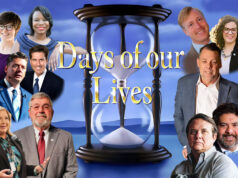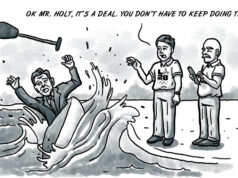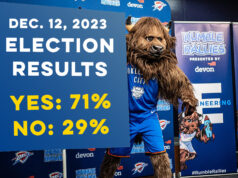
As states like New York and Texas weigh in over the legality of daily fantasy sports, some Oklahoma legislators and industry lobbyists are supporting a bill that provides basic regulation of the burgeoning but divisive industry.
If passed, House Bill 2278, a consumer protection bill authored by Rep. Justin Wood (R-Shawnee) and sponsored in the State Senate by Sen. David Holt (R-Oklahoma City), would create the Oklahoma Fantasy Contests Act. The bill establishes a baseline of professional conduct for daily fantasy sports sites such as FanDuel and DraftKings. This includes regulations against employees of such companies competing in contests, provisions for age verification and disclosure of the number of contests individuals can join, and a requirement that such companies keep operating cash and prize funds separate.
“My first inclination is to not regulate the industry,” Holt said. “I’m a free-market person, and I don’t see value in the regulation of occupations and businesses unless there’s a need to protect the public. However, the industry, through some of its leading brands and its trade association, wants to see a minimum of regulation in Oklahoma.
“Like I said, it makes me uncomfortable to carry a regulatory bill, but a cross-section of the industry wants to see this happen.”
James McSpadden, a contract lobbyist who carries the Fantasy Sports Trade Association as a client, said more than 600,000 Oklahomans take part in fantasy sports, which is why his group is working to push HB 2278 to eventual passage.
“It’s always interesting when an industry wants to proactively regulate itself, and that’s what we’re doing,” McSpadden said. “It’s really for our customers.”
A legislative reaction to scandal, attorneys general
By pushing for such legislation, the daily fantasy sports industry is looking to define itself rather than have others do it. The Oklahoma legislation is one of many similar bills drafted in other states, including Indiana, California and Florida — a quick legislative reaction to a scandal that has attracted close scrutiny of the industry.
On Sept. 27, 2015, Ethan Haskell, a content manager for DraftKings, earned $350,000 in one daily contest on FanDuel after posting information that appeared to give him a competitive advantage. A DraftKings internal review later determined Haskell’s post came after the deadline for submitting his team lineup.
Still, the revelation, which gave off a considerable whiff of insider trading, sparked an investigation by the Department of Justice and the Federal Bureau of Investigation into whether daily fantasy sports constituted gambling and, thus, violated the Unlawful Internet Gambling Enforcement Act of 2006.
Holt said the industry’s push for regulation is a clear indication that daily fantasy sports wants to be seen as a clean, above-board activity.
More Info
A partial list of daily fantasy sports site eligibility by state as of December
“They want to be clear that they don’t want to see this happen again,” he said.
Since the investigation began, attorneys general in New York, Illinois, Hawaii and Texas declared daily fantasy sports illegal under their respective states’ gambling laws.
“It’s my duty as attorney general to look to the law, as passed by the people’s representatives, to answer the questions put to this office,” Texas Attorney General Ken Paxton said on Jan. 19. “Paid daily ‘fantasy sports’ operators claim they can legally operate as an unregulated house, but none of their arguments square with existing Texas law. Simply put, it is prohibited gambling in Texas if you bet on the performance of a participant in a sporting event and the house takes a cut.”
‘I realized how bad I sucked’
The Fantasy Sports Trade Association, which represents DraftKings, FanDuel and more than 300 smaller operations like FanPicks, maintains that daily fantasy sports contests are games of skill, not games of chance.
On Jan. 20, one day after Paxton released his statement, Dallas Mavericks owner Mark Cuban addressed the FSTA’s winter meeting in Dallas and supported the association’s claims.
“Fantasy sports and DFS are not gambling. Period. End of story,” Cuban said during his keynote address. “You have to be smart, you have to do the work (…) you have to understand it. I’m not a DFS expert. I learned it’s a game of skill because I realized how bad I sucked and I had no chance of winning.”
FSTA’s website includes a section titled Why Fantasy Sports is Not Gambling, which asserts that DFS contests have outcomes that, in accordance with “carve-out” language in the Unlawful Internet Gambling Enforcement Act, reflect “the relative knowledge of the participants, or their skill at physical reaction or physical manipulation (but not chance), and, in the case of a fantasy or simulation sports game, has an outcome that is determined predominantly by accumulated statistical results of sporting events, including any non-participant’s individual performances in such sporting events.”
Jon Hamm of Edmond is a manager of the Discovering Fantasy Football League, a traditional fantasy competition comprised of Hamm’s colleagues at the Oklahoma Medical Research Foundation. No cash is rewarded at the end of the season: Instead, the winner receives a trophy featuring a double helix with footballs acting as the base pairs.
Hamm said he understands the argument that skill and strategy are important to succeeding in fantasy sports, but he cannot ignore the element of chance.
“I got into it because of the numbers aspect, and I’m a numbers guy,” Hamm said. “But I guess you can crunch a bunch of numbers, whether you’re a casual player or a Stanford guy running statistical modeling, and your player can still get injured in the first quarter.”
From Sandbox.com to daily games on mobile devices
The difference between daily fantasy sports and the traditional model comes down to the number of hours in a contest. Hamm and his friends at OMRF play over the course of an entire season of actual gameplay, while the daily fantasy sports sites offer contests that take place over the course of a week or even a single day.
FanDuel and DraftKings represent a recent surge of interest in daily fantasy sports, having established operations in 2009 and 2012, respectively, and each is currently valued at more than $1 billion. But fantasy sports play dates back to the early 1960s, when Wilfred “Bill the Gill” Winkenbach, a limited partner in the Oakland Raiders, established the basic rules and points system for fantasy football with the Raiders’ public relations manager, Bill Tunnel.
For three decades, fantasy sports contests took place in a non-digital world ruled by newspaper sports sections, ledgers and chalkboards, but in 1995, Sandbox.com became the preeminent free website for creating and monitoring the progress of fantasy teams.
“I started my first league in 1998 on Sandbox,” said Ryan Abernathy of Oklahoma City. “Sandbox was the be-all, end-all of fantasy sports, and then they were bought by Rotoworld. I’ve played in several different leagues, but I moved over to ESPN about 10 years ago.”
Abernathy’s contests follow the traditional model of fantasy sports and take place over the course of a full season. To put it in non-sports terms, Abernathy is a long-term investor in a world where day trading is the hot new thing. He said his main interest in fantasy sports is social — most of his league consists of friends from college. He likens his team to the characters on FX’s The League (but less aggressively profane).
“It’s guys constantly talking smack about each other — it’s a relationship thing,” he said. “It’s how we come back together every year over something we love.”
For Abernathy, that essential ingredient is missing in daily fantasy sports contests. He prefers the friendly and occasionally raucous nature of organic play.
Still, he is keeping an eye on daily fantasy sports. Like everything on the Internet, the industry is moving at light speed, and he wonders if the current legislation can keep pace with its development.
“I’m glad that they are taking steps to regulate their industry, but whatever is written now will probably be torn up and rewritten in five or 10 years,” he said.





















